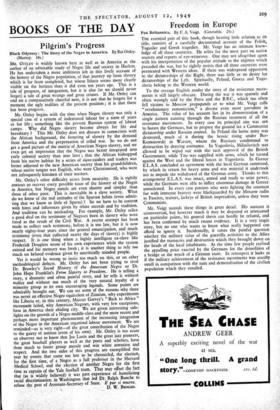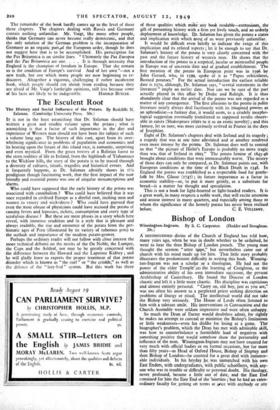Freedom in Europe
Pax Britannica. By F. A. Voigt. (Constable. 25s.) THE essential part of this book, though bearing little relation to its title, consists of a carefully documented account of the Polish, Yugoslav and Greek tragedies. Mr. Voigt has an intimate know- ledge of all these countries. He relies for the most part on native sources and reports of eye-witnesses. One may not altogether agree with his interpretation of the popular attitude to the regimes which preceded the war, but he rightly insists that all three countries were permeated with Western ideas. If there was widespread opposition to the dictatorships of the Right, there was little or no desire for dictatorships of the Left. Spiritually, Poland, Greece and Yugo-. slavia belong to the Western world.
To the average English reader the story of the resistance move- ments is still largely obscure. During the war it was sparsely and often wrongly told by the Press and the B.B.C., which too often fell victims to Moscow propaganda or to what Mr. Voigt calls "revolutionary romanticism," a disease even more prevalent in America. The value of his account lies in its demonstration of a single pattern running through the Russian treatment of all the resistance movements. In every case its principal aim was not to harass the Germans, but to prepare the ground for a Communist dictatorship under Russian control. In Poland the home army was destroyed, much of it during the heroic rising under Bor- Komorowski in Warsaw, whom the Russians condemned to destruction by denying assistance. In Yugoslavia, Mihailovitch was allowed to be wiped out with the tacit approval of the British Government, while Tito was supplied with arms, which he turned against the West and the liberal forces in Yugoslavia. In Greece E.L.A.S. concluded an agreement with the local German command, by which in return for heavy arms and war material it undertook not to impede the withdrawal of the German army. Thanks to this arrangement E.L.A.S. was intact, armed and ready to seize power, while the Germans were able to inflict enormous- damage in Greece unmolested. In every case patriots who were fighting the common foe with immense bravery were blackguarded by the Moscow radio as Fascists, traitors, lackeys of British imperialism, unless they were Communists.
Mr. Voigt records these things in great detail. His account is controversial, but however much it may be disputed or attenuated on particular points, his general thesis can hardly be refuted, and has been confirmed by much recent evidence. It is a very tragic story, but no one who wants to know what really happened can afford to ignore it. Incidentally, it raises the painful question whether the military value of the guerrilla activities to the Allies justified the massacres and destruction which they brought down on the heads of the local inhabitants. At the time few people realised the appalling price exacted by the Germans for the demolition of a bridge or the wreck of a German train. In retrospect it looks as if the military achievement of the resistance movements was usually small in comparison with the ruin and demoralisation of the civilian population which they entailed. The remainder of the book hardly comes up to the level of these three chapters. The chapters dealing with Russia and Germany contain nothing unfamiliar. Mr. Voigt, like many other people, thinks that Germany can never become really democratic, and that the only solution of the German problem is the incorporation of Germany as an organic part,of the European order, though he does not suggest how that is to be accomplished. His prescription for the Pax Britannica is on similar lines. "Ultimately the Pax Europea and the Pax Brikumica are one. . . . It is through necessity that England is the champion of freedom in Europe. That she remain so is the condition of Europe's survival And of her own "—not a new truth, but one which many people are now beginning to re- discover. Altogether a vigorous, challenging if rather incoherent book, which people should not shrink from reading because they are afraid of Mr. Voigt's forthright opinions, still less because some ef his facts are likely to be indigestible. Meow Burt.Ea.































 Previous page
Previous page